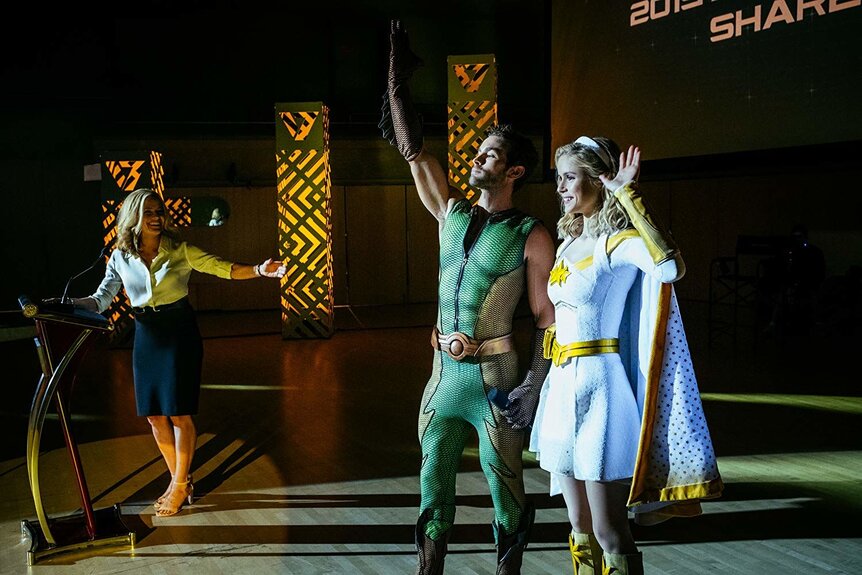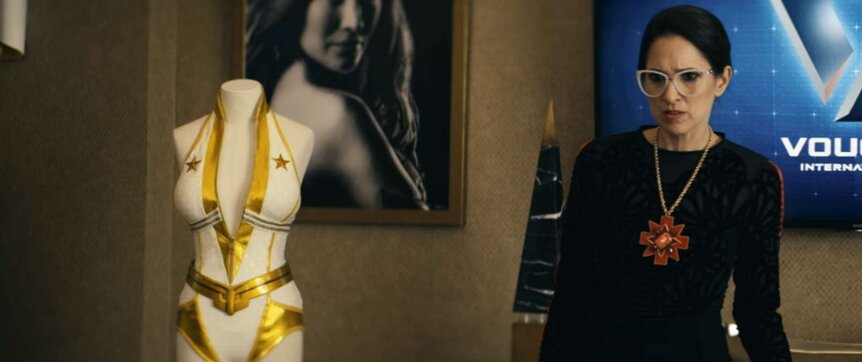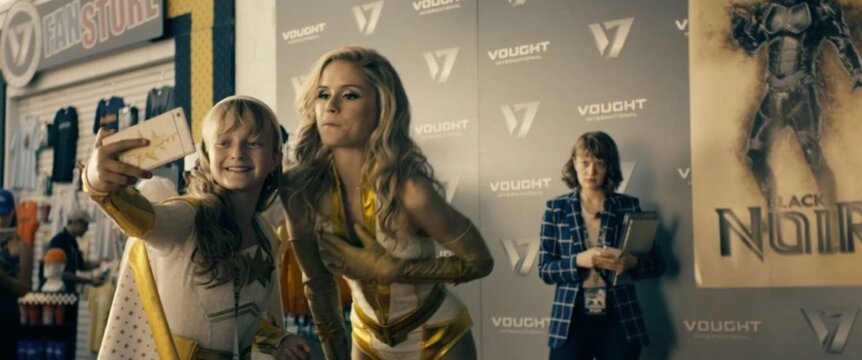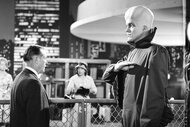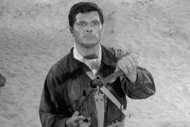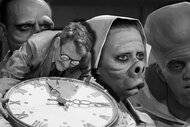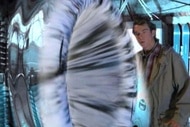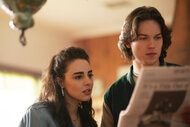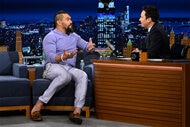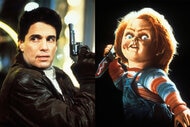Create a free profile to get unlimited access to exclusive videos, sweepstakes, and more!
Why Starlight's 'empowering' costume evolution in The Boys is so effective
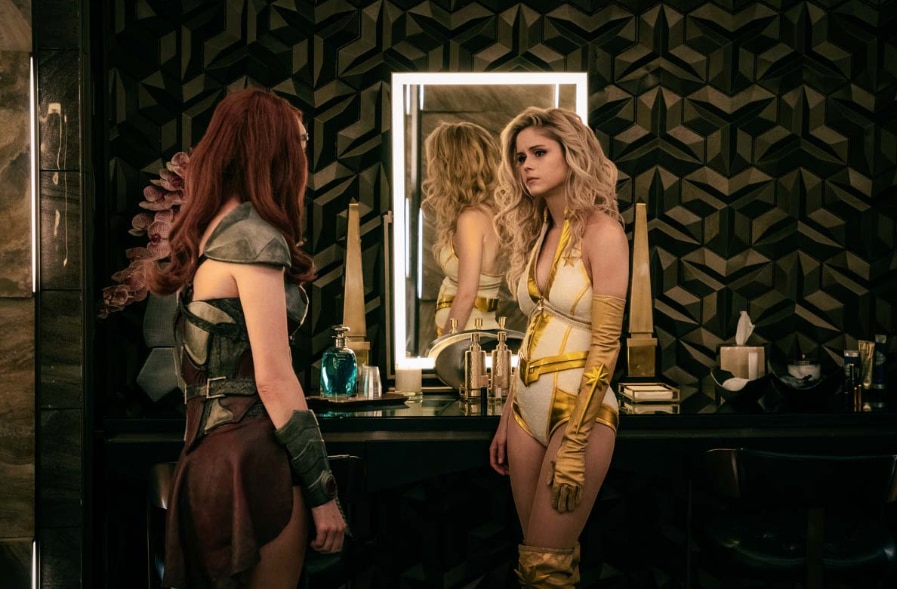
"I can't wear that."
This is what Annie January, aka Starlight (Erin Moriarty), intones in the third episode of The Boys. The problem? The updated skin-baring superhero costume that has been presented to her is "not me." Living in a world where those with powers are marketed as part of multibillion-dollar conglomerate, Vought International's brand identity requires certain commitments. Treated like celebrities, the elite members of the Seven undergo stringent PR evaluations to maximize areas that are scoring well with certain demographics. Everything they say, wear, or do is measured against publicity metrics, which is how Starlight ends up with an updated costume that she instantly loathes.
The Boys depicts how the superhero sausage gets made, including the contrast between the public-facing persona and their private behavior. When Annie joins the Seven, she has already crafted a wholesome girl-next-door aesthetic. Her midwestern appeal might read as corny and lacking edge, but there is nothing phony about her desire to do good. She bought the lie Vought International has been perpetuating, but she quickly discovers it's just PR spin after her interactions with the other members. She is admonished by Vought International publicist Ashley Barrett (Colby Minifie) for getting caught on camera saving a woman from two rapists because she did so unsanctioned and in civilian clothes. The latter means that people on social media have figured out her real identity — purposefully perpetuating the ridiculous notion that a costume somehow masks who you really are. Ashley is furious at Annie, but soon changes her tune when the numbers go in Starlight's favor.
Saving people isn't the number one priority when money is on the line and everything the Seven does is geared toward financial targets. This includes how Annie's superhero persona will benefit Vought, whether it is to sell more merchandise or gain positive publicity. Fighting in her street clothes is not going to cut it (even if Starlight-branded sweats would shift some units), which is why she needs a sartorial upgrade to mark her arrival.
Rather than cementing her team player status, the Starlight costume "upgrade" consultation causes her to push back further. It is indicative of what kind of audience these Vought decisions are made to cater to, leaning into old sexist archetypes under the guise of "girl power." Annie is told to embrace her feminist strength by wearing less clothing. In this case, one woman's empowerment is another's exploitation.
Marketing team Seth (Malcolm Barrett) and Evan (David Reale) talk in buzzwords and plaudits, telling her, "It's totally you. It's bold, it's brave, it's feminist" and "It says you're confident in your own skin, and you're not afraid to show it." She can opt to not wear the skimpy one-piece, but she will no longer be part of the Seven. This has been her dream for as long as she can remember, so Madelyn (Elisabeth Shue) is banking on Annie's compliance when she presents this ultimatum.
Isadora (Débora Demestre), the designer of the new Starlight costume, is particularly aggrieved by the newcomer's negative response. "This isn't my first rodeo," she tells Annie, pointing out that she designed Homelander's (Anthony Starr) patriotic suit. While she is certainly skilled, Isadora is also part of the machine, and she has a specific mandate to follow. The two men try to sell this transformation story but have very little to back it up beyond empty platitudes. Ultimately, Starlight acquiesces and toes the company line in a makeover that goes beyond this provocative garment. The small wedge boots are switched out for thigh-high stilettos, and she wears more makeup and hair extensions.
Costume designer Carrie Grace explained this notion of Starlight voicing her concerns in this scene as "A lot of times, it's everyone else who's trying to tell a woman how to dress, other than the woman who's actually in her own skin and knows herself better than these other people." Speaking up when we are uncomfortable is not easy, and while Annie is rebuffed, this moment is part of the familiar toxic workplace tapestry — whether you are a superhero or not.
At a meet-and-greet in "Get Some," a young girl wears the now-outdated star-covered caped, drawing a regretful smile from her superhero favorite. Happily obliging to a selfie, Annie covers her cleavage, but that doesn't stop a random dude yelling crude comments in her direction. A back-and-forth with Starlight's costume takes place over the season as she continues to champion her cuter caped design. In "Good for the Soul" she tells Hughie (Jack Quaid) the new costume sucks after he compliments the return to her previous attire. Because that old aesthetic is deemed "family-friendly," she is permitted to wear this costume to the "Believe" Expo, which is incredibly telling. After her daring speech at the religious event, she uses the momentum as leverage, telling Madelyn, "I think that firing an employee after she reported sexual assault on live TV might tank your stock prices." Madelyn helped create the superhero myth to sell some shares, but Starlight is intent on living this ideal in the costume of her choosing.
This battle of wills is far from over, which sees feminism as a marketing tool perpetuated in the Citizen Starlight teaser — a trailer that has been cobbled together from various footage of the superhero starlet. Furthermore, she doesn't completely ditch the more adult garment, which she wears to the company party in the finale after the revelation that Hughie has ulterior motives against the Seven. She's reluctantly embracing her new life and marketing demands. After Maeve (Dominique McElligott) tells her "to be original" she reverts to her former attire, although the Season 2 trailer and promo images suggest she is embracing the leotard look. The latter could be a ploy to make her appear more trustworthy to her colleagues when she has other intentions.
The Boys is at its strongest during insightful capitalism critiques that reflect the committee-by-numbers approach to entertainment, including the costumes worn. Annie's Starlight skimpy evolution speaks to the wider themes while underscoring her season-long struggles as she not only assimilates with the difficult co-workers but also learns how to work with management — what could be more relatable than that? By bristling against the corporate powers, Annie is branded as a "diva" and a "selfish arrogant child" when all she is doing is embodying the brave feminist persona they marketed her as having. Actions speak louder than words, and so does the superhero costume Starlight chooses to wear.
